Good night, sleep tight, don’t let the…Bag Man bite? For its first offering of the semester, the Performing Arts Department is presenting a collection of 10 minute, student-directed plays, among them the “creepy and funny” Bedtime. Taken from a collection of short plays by Steve Yockey entitled “Very Still and Hard to See,” Bedtime follows two young women, Violet and Julie, as Violet reveals that for her whole life, a mysterious “Bag Man” has been killing people close to her. As Julie struggles to understand this strange new aspect of her friend, Violet prepares to take her future into her own hands. “I like the idea of someone taking charge of their life,” says director Julia Rocke, a senior acting major. Rocke, who is having her directorial debut with Bedtime, seems to be filling in the role of director well during a Monday night rehearsal, working with actors one-on-one and giving feedback after each run-through. “I was really nervous just to interpret something and have someone watch it…and get the story right,” she says during a rehearsal break, also commenting that the characteristics of and the dynamics between the two female leads spurred her decision to work on this play. Starring as Violet and Julie are sophomores Sarah Spickard and Kinsey Sarian, who both experienced interesting challenges in their characters. “I’ve never been in a situation before where a) there’s a killer involved and b) where my best friend would put me in harm’s way,” says Sarian. Spickard agrees, saying that “just trying to come up with a rich inner life for this obscene character [Violet] has been a challenge.” With only 10 minutes to communicate character, plot, background and more to an audience, the actors and directors are faced with a hefty challenge...
Playwriting: Crossing the Border
posted by Nick Martinez
What are the borders in our lives? The physical, psychological borders that strain our society? That is the central question SFUAD’s playwriting class hopes to answer in its spring production of Borders: Crossing the Line. Dale Dunn and Lynn Goodwin are in their second year of teaching playwriting, a class that started as an independent study. But, the duo felt the craft of playwriting deserved a more permanent home in SFUAD’s curriculum. “It’s a wonderful outreach project for the university,” Dunn said. In the class’ first year, Dunn and Goodwin produced Left to Our Own Devices: Staying Connected in the Digital Age. It was performed off campus at Warehouse 21. “When we performed last year a lot of people came up and said ‘well I’ve never seen anything by the university,’” Dunn began. “A lot of people hesitate to come out to the campus, but having the show in downtown Santa Fe opens up access to a lot of different audience members who were thrilled to see the variety of students that we have here, and hear their different opinions of what’s going on.” The production was performed in partnership with students from the New Mexico School for the Arts, a performance high school in Santa Fe. They plan to continue the collaboration this year as well. When asked if some of the dark, adult subject matter was too much for high school students, Goodwin was dismissive. “Oh no,” she said. “Sometimes they’re worse than you guys.” Goodwin and Dunn were well aware of the tumultuous times we are living in, which heavily informed their opinion for this year’s subject: borders. Between foreign soil struggles, like ISIS and the Israeli-Palestinian conflict, as well as domestic court cases that highlight our current racial tension, the duo felt that a nuanced look at universal division was needed. “[We want] students to see where they are, and feel like they have a voice in the world, that their voice is heard,” said Goodwin A typical class starts with a discussion on a play students read for homework. The plays vary from classics like A Streetcar Named Desire, to untraditional plays like The Laramie Project and Ajax in Iraq. This transitions into a general discussion of craft, often using other plays as examples. Lastly, a significant portion of class time is spent writing and workshopping pieces. One of Dunn and Goodwin’s favorite aspects is the diversity of voices in the classroom, with majors ranging from Creative Writing to Music, Performing Arts to Film. “We’re always surprised by the shape that it takes, because of everyone’s different point of view,” said Goodwin. Santa Fe will have to wait until early May to see just what those different opinions are....
Verve Photography Exhibit
posted by Andrew Koss
SFUAD Photography Program Director Tony O’Brien, David Scheinbaum and Norman Mauskopf exhibit work at Verve.
Dynamic Duo
posted by Serafima Fedorova
Sam Armstrong-Zickefoose and Konor Hunter-Crump discuss their new duo Zickey and the Condor.
Film Students Take on YouTube
posted by Nicholas Beckman
Jackalope Magazine recently sat down with senior film student William Khouri whose latest project is ArcadeTV, a comedy series planned for YouTube.
Asexuality: A Q/A
posted by Charli Renken
As part of our 2015 initiative to foster dialogue about gender and sexuality on campus, Jackalope Magazine conducted a Facebook interview with freshman Creative Writing major Marisa Zapata about asexuality and the stigma behind it
“History of Navigation”...
posted by admin
Emily Zhang’s “History of Navigation” received third place in the 2015 Glazner Prize for Creative Writing contest, sponsored by SFUAD’s Creative Writing and Literature Department. On Atlantic Street a girl lies on the street with vultures in her throat, the moon melting into the eggshell of her eyes melting into me. I don’t know if she swallowed the sky or if the sky swallowed her, but she is spilled like a run on sentence, preserved in past tense and the holy glow of streetlight. An exercise in forbearance. Two months after my grandfather said the name of what would kill him, we spilled salt on our tongues and drank soup too sparse to be unstill. My uncle drove without a seatbelt swathed across his shoulders. He drove until he saw a lake that wrapped its fingers around the sky’s neck and exhaled while the sky inhaled. Until he saw a bird and tried to catch it, but its wings broke off when he grazed it, and he closed his palms over its eyes and pressed, learned that he couldn’t protect anything anymore. Six years ago a man on the telephone told her to put her hands between her thighs and squeeze and she told him nothing. A ritual in reverse. All I know is that we all have the animal want in our stomachs to float, that they are burning newspapers on Atlantic Street now. When the universe was first beginning a bird took a flashlight from a trashcan and dropped it into a beautiful coffin. In five hundred years someone will unearth this moment without the girl, in the wicked heat of June, tucked in concrete like an exhalation. I wish I...
“Hair”
posted by admin
“Hair” by Joseph Jordan-Johnson received second place in the 2015 Glazner Prize for Creative Writing contest, sponsored by SFUAD’s Creative Writing and Literature Department. Roots I have my father’s hairline. A widow’s jut in the middle of my forehead. I have naps—scalp clumsy. His waves were smooth, current-cut, razor-precise. He never told me how he keeps the gray from creeping in. He is 53, a silver fox smile cutting from ear to ear. My scalp is too oily, lacquered, pore-thick. My hair runs bristle wired, strung, dry and clumped. I have ignored how he taught to keep it clean. Cut They are rigored, the coroner’s faint clipper buzz is a lullaby. There seems to be less hair on the floor each time I cut, less tufts to sweep, less bodies to hide. Shower It is hot, in the way that pain cries. Holy, in God’s new breath, it is His steam that will bring more wrath than Murray’s wave gel, the things my father always used. The things I learned to hate. Shave More scratch than bite— less rough along the grain. The basin of the tub runs black and red, nicks of hair crawling to the drain. I hear them howl, there is wrath in each pull each razor-tear each pore less bloody than the other. They are him, not His. Dry Fresh. Something God has assumed. Something only death can say. I am bulbous, not whitehead, not ready to pop. There are years I have shaved– fifty-three bags all in a pile. The buzz has stopped. The wrath looks less bloody. The zipper closes. Joseph Jordan-Johnson is a senior at...
2015 Glazner Contest Winners
posted by admin
With students from 87 high schools across the country submitting 140 entries to the 2015 Glazner Prize for Creative Writing, competition was fierce. This year’s winners were announced this week, chosen by SFUAD’s Creative Writing and Literature Department co-chairs Matt Donovan and Dana Levin. Named for the founder of the Creative Writing Program, Greg Glazner, the Glazner contest was conceived as a way to engage creative writing high school students across the country with SFUAD’s Creative Writing Department. Winners receive publication of their award-winning writing in Jackalope. Additionally, the first place winner receives an iPad with retina display; second place receives a Kindle Fire; and third place receives a $50 Amazon gift card. And the winners are… Alexandra Spensley is a junior at Avon Lake High School in Ohio. She was named a finalist in the Sierra Nevada College High School Writing Contest, and her recent work has appeared or is forthcoming in Cadaverine, The Postscript Journal, Canvas Lit, and Crashtest. Her writing has also received recognition from the Live Poets Society of New Jersey and Vincennes University. Read her award-winning piece, “Portrait of a City.” Joseph Jordan-Johnson is a senior at Oak Park and River Forest High School in Illinois, who says she doesn’t take herself “very seriously—I’m not entirely sure if this is good or bad. I enjoy long walks on the beach and effective discourse on racial equality in America. I believe the written word is the most raw form of communication, stripping narratives of the language that makes them whole, and creating art within the shells you made. Also, I’m irrationally in love with Beyonce.” Read his award-winning piece. “Hair.” Emily Zhang is a high school junior from Richard Montgomery High School in Maryland. Her writing has been recognized by the Scholastic Art and Writing Awards, the Poetry Society of England, the Sierra Nevada Review, and Princeton University. She enjoys watching reality television. Read her award-winning piece, “History of Navigation.”...
“Portrait of a City”
posted by admin
“Portrait of a City” by Alexandra Spensley received first place in the 2015 Glazner Prize for Creative Writing contest, sponsored by SFUAD’s Creative Writing and Literature Department. Part I: Streets & Avenues The city receded like tidewater, brackish. I watched it slide. Metal accepted metal in a blur of ticking steel, urban heartbeats. Sidewalks swallowed themselves: unclean tongues roving through a city scorched sideways. Who will shoulder this weight? I am left with empty husks, the shadows of buildings ashen as roman carpets. Alone, I map my way through the rubbish: slabs of stone, loose teeth, a child’s violin splayed open and bleeding, red-eyed mice twisting in its hollow chest. I hung the city like wallpaper, then tore it in two— and it was not stitched from a paste of broken stars, not submerged in the hot sways of red dresses— no, the city was a cut-glass mobile, enthralling, suspended above a child’s eager hands. Part II: Harvests We knew we were done for when the newspaper said one-fourth of the houses in the eastern district now stood vacant, empty monuments to the past. That same newspaper had voted us best hardware store in the city for three nonconsecutive years—we had their dates on a plaque in the frosted-glass window out front—but who needs a hardware store when there’s no houses left? I started rearranging things. I moved the Phillips screwdrivers to aisle four and put most of the auto parts by the cash register. Nothing worked except positioning the blue paint-thinner jars in front of the window; this spiked sales for a few weeks before my conscience made me move everything back. Soon nearly everyone who came in was trying to tune up their cars for the long drive to a new house, buying gallon jars of oil and gas or trailer hitches for U-Hauls. When I asked them where they were moving to, they all mumbled something along the lines of “Oh, Barb and I are headed west” or “We’re taking the kids up north for high school”—indiscriminate, vague substitutes for “anywhere but here”. Outside, foreclosure signs sprouted like poppies in a pasture. Outside, the rain started. I thought we could struggle by on what we’d saved up from the good years, but when the generator busted ($5,000) and the roof started leaking ($6,000), I had no choice but to close the place down. I used all of our meager revenue from the past four months printing out huge black-and-red EVERYTHING MUST GO signs, hung them out front next to the posters of angry-eyed kids with ‘missing, desperacido‘typed in block letters on top. There were dozens of those missing posters—I pasted each one I found; I just couldn’t stand those kids’ eyes. My wife suggested that we move out after closing shop, let our house become another shuttered tomb in the sea of a dying city. I told her no, I couldn’t release this land after so many years of holding it— so long that it had bloomed roots around my tired wrists. Still, the sight of the grocery on Sunday pierced me: washed-out high school kids, coughing up cigarettes in the parking lot; shelves heavy with a lack of bread; the thick, tangible seep of money right into the greedy earth. Gone. In the end, we couldn’t sell everything in the shop and drove it to the town dump instead; we needed three full pickup beds to move it all. Paradoxically, the dump seemed to be the liveliest place in the city: laughing, tanned men in cutoff shirts, cheerily tossing mountains of metal screws and power drills into the gaping tongue of a trash compressor. The leather of the pickup’s passenger seat stuck tight to my thighs; soon, summer would be here. In the rearview mirror, I watched the men heave trash bags over their shoulders like insect cocoons full to bursting, like a reaping of...
Bringing “For Colored Girls” to Life
posted by Zoe Baillargeon
Tikia Fame Hudson is in the process of directing “For Colored Girls,” set to perform in the blackbox theater at Warehouse 21 on Feb. 27 and 28.
Introducing 1905 MAGAZINE
posted by Cydnie Smith-McCarthy
1905 Magazine has been a buzzing topic amongst the SFUAD student body as of late. Darnell Thomas and Mariah Romero, editors of the magazine, have put their heart and soul into this self-made, long-term project.

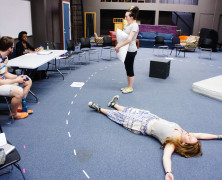
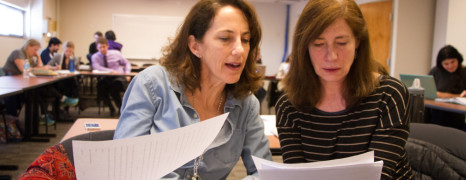
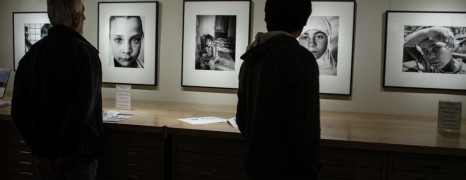
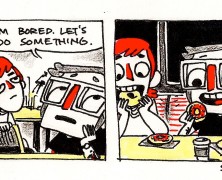
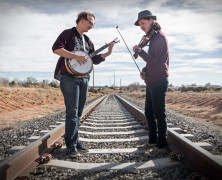
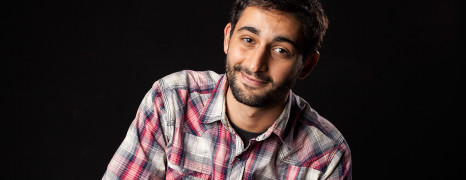
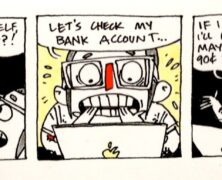
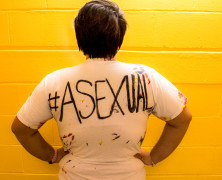
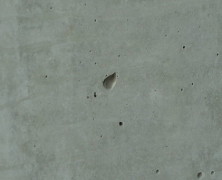
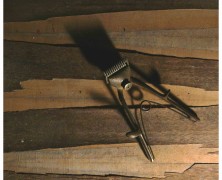
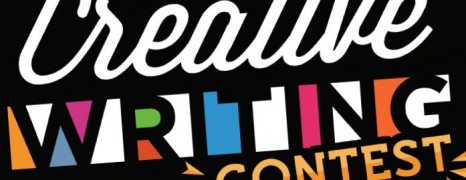
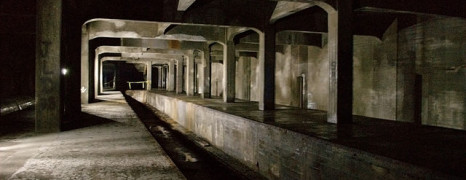

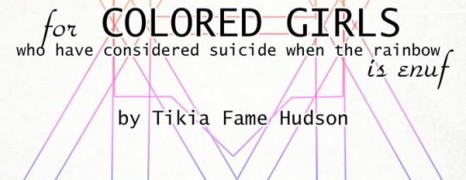
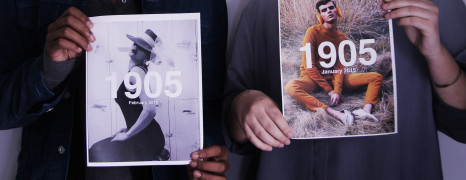
 Jackalope Magazine is the student magazine of Santa Fe University of Art and Design. Building on the interdisciplinary nature of our education, we aim to showcase the talent of our university and character of our city.
Jackalope Magazine is the student magazine of Santa Fe University of Art and Design. Building on the interdisciplinary nature of our education, we aim to showcase the talent of our university and character of our city.